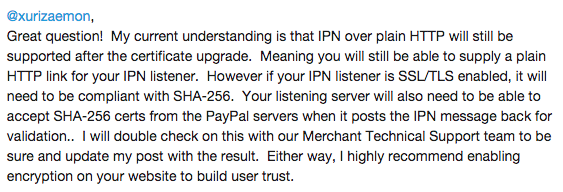PayPal is upgrading their certificate and require that people's certificates are also upgraded. Copying the notice below.
But IPN can currently be used without a certificate. Does anyone know if that will not be allowed in future? Or if the older certificates will not work but non-ssl connections will continue to work?
I know it's advisable to have SSL... But some sites want to avoid having SSL and that's why they use PayPal, to avoid asking for credit card information on their site.
PayPal email:
As we have previously communicated to you, PayPal is upgrading the certificate for www.paypal.com to SHA-256. This endpoint is also used by merchants using the Instant Payment Notification (IPN) product.
This upgrade is scheduled for 9/30/2015; however, we may need to change this date on short notice to you to align to the industry security standard.
You’re receiving this notification because you’ve been identified as a merchant who has used IPN endpoints within the past year. If you have not made the necessary changes, we urge you to do so right away to avoid a disruption of your service!
Merchants using PayPal Instant Payment Notifications (IPN) may be impacted by the change if their web server is not enabled for SHA-256 compliance. If you are using a 3rd party solution for order management and for integrating PayPal on your website, you may be using IPN. Please check with your shopping cart provider to see if you are affected.
and
If you are a merchant who uses IPN with PayPal, your server will need to be upgraded to support SHA-256. Please contact your web host or the checkout partner providing the integration solution to ensure SHA-256 is enabled for the server.


